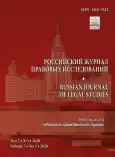Islamic Law in the jurisdiction of International Financial Centers: comparative legal analysis
- Authors: Didikin A.B.1
-
Affiliations:
- Institute of State and Law, Russian Academy of Sciences
- Issue: Vol 7, No 1 (2020)
- Pages: 78-85
- Section: International law
- URL: https://journal-vniispk.ru/2410-7522/article/view/33910
- DOI: https://doi.org/10.17816/RJLS33910
- ID: 33910
Cite item
Abstract
The article analyzes the modern mechanisms and ways of adapting the Islamic law principles and norms to the regulation of financial relations. Taking into account the significance of fiqh as a legal doctrine that interprets religious prescriptions for law enforcement, the key features of the Islamic law institutions in the context of the Islamic economy model development are identified. The object of the comparative legal analysis in the article is the jurisdiction of international financial centers as territories with a special legal regime for conducting business. Its legal status is fixed in special legal acts, thus contributing to the formation of flexible instruments of legal regulation in view of the correlation with the norms of the national legal order. International financial centers are presented as an example of the formation of global legal institutions in Western countries as well as those in Southeast Asia and the Middle East. The author argues that Islamic finance—as a way of adapting Islamic law principles to the regulation of business activities—is a mandatory element of a legal environment for international financial centers.
Full Text
##article.viewOnOriginalSite##About the authors
Anton B. Didikin
Institute of State and Law, Russian Academy of Sciences
Author for correspondence.
Email: abdidikin@bk.ru
Doctor of Philosophy, PhD in Law, Head of the Department, Leading Researcher of the Department of Legal Philosophy, Legal History and Legal Theory
Russian Federation, MoscowReferences
- Baydaulet E.A. Osnovy eticheskikh (islamskikh) finansov [Foundations of Ethical (Islamic) Finance]. Pavlodar, 2014. 326 p.
- Chennosti i principi islamskoy economiki [Values and Principles of Islamic Economics]. Moscow, 2017. 176 p.
- Damirli M. Islamskoe pravo v sravnitelnoy perspective: osnovniye rakursy issledovaniya [Islamic Law in Comparative Perspective: main lines of research]. Yuridichniy vestnik. 2014;3:14-18.
- Islamskoye pravo. T. 2. Voprosy ekonomiki i obshestvennikh otnosheniy [Islamic Law. Vol. 2. The Questions of Economics and Social Realtions]. Moscow, 2017. 400 p.
- Kalimullina M. Standartizatsiya islamskikh finansovikh sdelok [Standarization of Financial Transactions]. Actual Problems of Russian Law. 2017;3:122-126. https://doi.org/10.21684/2412-2343-2016-3-1-126-137
- Kuliyev E. Smyslovoy perevod Svyashennogo Korana na russkiy yazik [Sence Translation of Saint Koran on Russian Language]. Medina, 2002. 1090 p.
- Pravo i religiya v mezhdisciplinarnoy interpretacii [Law and Religion in Interdisciplinary Interpretation]. Edited by A. Didikin. Moscow, 2019. 408 p.
- Sukiyainen L.R. Konstitucionniy status shariata kak istochnika zakonodatelstva v arabskikh stranakh [Constitutional Status of Sharia as a sourse of legislation in Arabia Countries]. Law. Journal of Higher School of Economics. 2016;4:205-222. https://doi.org/10.17323/2072-8166.2016.4.205.222
- Yandiyev M.I. Islamskie finansi: neblizkie perspektivi formirovaniya polnochennoy finansovoy modeli [Islamic Finance: Hard Perspectives for forming the real financial model]. Actual Problems of Russian Law. 2017;4:65-71.
- Zhuravlev A.Yu. Islamskiy banking [Islamic Banking]. Moscow, 2017. 232 p.
- Accounting and Auditing Organization for Islamic Financial Institutions (AAOIFI). // AAOIFI. URL: https://aaoifi.com/?lang=en (Accessed: 20.04.2020). https://doi.org/10.2139/ssrn.3077366
- Casper M., Asma Ait Allali. Islamic Finance Made in Germany — A Case Study on Kuveyt Türk (KT Bank): Germany’s First Islamic Bank. 2017. URL: https://www.unimuenster.de/imperia/md/content/religion_und_moderne/preprints/crm_working_paper_15_casper_allali.pdf (Accessed: 08.04.2020).
- Certified Expert in Islamic Microfinance. // Frankfurt School of Finance & Management. URL: https://execed.frankfurt-school.de/en/home/individuals/sustainable-development/expert-islamic-microfinance (Accessed: 21.04.2020).
- Demand rises for education in Islamic finance. // Financial Times. URL: https://www.ft.com/content/2fcf979a-96d2-11e6-a80e-bcd69f323a8b (Accessed: 22.04.2020).
- Ernst & Young S.A. The gateway for Islamic finance and the Middle East. 2016. URL: https://www.islamicfinance.com/wp-content/uploads/2016/06/Luxembourg-Islamic-Finance.pdf (Accessed: 17.04.2020).
- Global trends in Islamic finance and the UK market. 2017. P. 6. URL: http://ethicalfinancehub.org/wp-content/uploads/2017/12/Global-trends-in-Islamic-finance-and-the-UK-market-2017.pdf (Accessed: 20.04.2020).
- HK banks on Islamic finance. // China Daily Asia. URL: https://www.chinadailyasia.com/asiaweekly/2015-02/27/content_15232242.htm (Accessed: 25.04.2020).
- HKSAR Government’s Sukuk Offering. // Hong Kong Monetary Authority. URL: https://www.hkma.gov.hk/eng/news-and-media/press-releases/2017/02/20170222-3/ (Accessed: 21.04.2020).
- How is Islamic Finance different. // Geneva Business School. URL: https://gbsge.com/how-is-islamic-finance-different/ (Accessed: 22.04.2020).
- LFF Luxembourg for Finance. 2017. URL: https://www.luxembourgforfinance.com/wp-content/uploads/2019/01/lff_brochure_islamic_finance.pdf (Accessed: 15.04.2020).
- List of Islamic Banks In Hong Kong. // Global Banking & Finance Review. URL: https://www.globalbankingandfinance.com/list-of-islamic-banks-in-hong-kong/ (Accessed: 25.04.2020).
- List of Islamic Banks In Switzerland. // Global Banking & Finance Review. URL: https://www.globalbankingandfinance.com/list-of-islamic-banks-in-switzerland/ (Accessed: 11.04.2020).
- Master of Science Programs in Islamic Finance. // Masterstudies. URL: https://www.masterstudies.com/MSc/Islamic-Finance/ (Accessed: 15.04.2020).
- Mausen F, Dortschy Ch, Palgan E. Zofia White Luxembourg. // Islamic Finance and Markets Law Review. London: Law Business Research Ltd, 2018. P. 35‒49.
- The Islamic Finance and Markets Review. Edition 4. Luxemburg. // The Law reviews. URL: https://thelawreviews.co.uk/edition/the-islamic-finance-and-markets-review-edition-4/1209532/luxemb (Accessed: 10.04.2020).
- The UK can be a world leader in Islamic finance. // The Telegraph. URL: https://www.telegraph.co.uk/business/business-reporter/uk-islamic-finance/ (Accessed: 02.04.2020).
- Unternehmen. // IFIBAF. URL: https://www.ifibaf.com/about-us/ (Accessed: 21.04.2020).
- Westpac to offer Islamic banking. // The Sydney Morning Herald. URL: https://www.smh.com.au/business/westpac-to-offer-islamic-banking-20100211-nv86.html (Accessed: 22.04.2020).
Supplementary files







